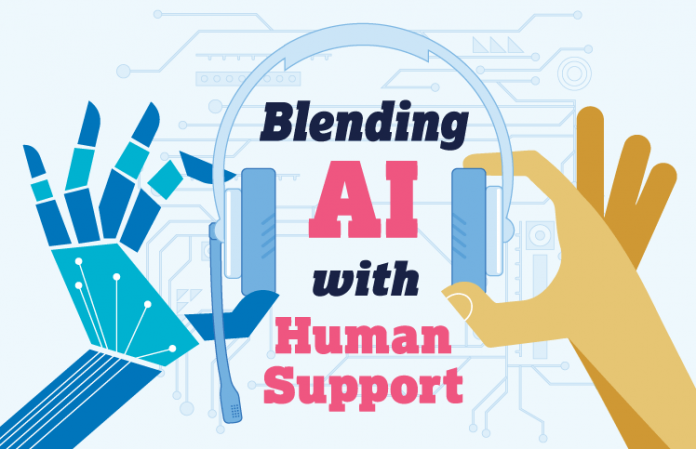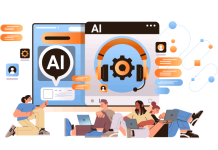
The future of work and the impact that artificial intelligence will have on the workforce has been a hot topic lately. The publicity has been a bit unsettling, though, given the tendency to couple the acronym AI with the word “replace”—as in “AI Will Replace Half of All Jobs in the Next Decade” or “Could AI Replace Teachers, Lawyers, Drivers, Doctors, [fill in your job]?”
These types of headlines might lead you to believe that call center agents will soon become unicorns, along with other support-type positions that include a lot of repetitive tasks and activities that can be automated. But exchange the word “replace” with “enhance,” “augment” or “transform” and that may provide a better sense of how customer-centric brands are leveraging AI to support the human element in their service operations.
Certainly, there are still companies that view the contact center as a cost center, and for these, the thought of replacing hundreds of frontline workers with robots might seem like a magical solution to control the costs associated with staffing and managing human agents. But the reality is that, despite the influx of digital channels in recent years, customers prefer to speak with a human when it comes to service issues (confirmed by recent studies from Verint and Accenture).
Separate the Hype from Practical Applications

When considering how AI can be applied in a customer service function, it’s important to separate fantasy from the practical applications, says Mikhail Naumov, Co-founder & CSO at DigitalGenius, an AI customer service solutions provider. “There definitely has been a lot of hype in this space,” he says. “Hollywood’s version of AI may or may not come to pass some time in the future, but let’s focus on the application that is real and practical today—deploying algorithms that save time and help customer service employees to be more confident in their responses. We all want the same things—happier customers and engaged employees.”
DigitalGenius’ Human+AI™ Customer Service Platform is trained on historical customer service logs and provides AI-powered macro suggestions, automation of ticket tagging, auto-triaging, as well as automation of responses. “These are the types of tasks that AI is good at,” he says, adding that the combination of human and machine intelligence can cut average handling time by up to 32% per message.
What is the ideal model for a customer service operation? Naumov recommends a blend where AI suggests content and humans act as the administrators of the system. “A lot of the work is done for them by the machine but then, ultimately, when it comes to sending the final message or solving a complex query, the human is still there to supervise the machine to make sure that it’s doing the best job possible,” he explains.
Freeing CSRs from repetitive manual tasks allows them to tap into their critical thinking and problem-solving skills, and to focus on transactions that require an emotional connection. Take, for instance, TravelBird’s approach to AI. The package holiday provider uses the technology to empower their customer service representatives, deliver a better customer experience and engage staff in an evolving, higher-skilled role.
Eliminating Repetitive Tasks Frees Agents to Connect

Maintaining a human interface with customers is a central element of TravelBird’s service mission. “People travel with their hearts and souls,” says Head of Customer Service & Care Fiona Vanderbroeck. “But travel sometimes can be unpredictable. Things occur that create questions, doubt or stress for travelers. Our core job is to manage our customers’ emotions by responding quickly and making a personal connection.”
TravelBird’s customer service operation handles approximately 900,000 inquiries per year, which are answered in 11 countries by email, phone, social media and SMS. The company’s rapid growth has led to a considerable increase in message volume. Rather than replacing its customer service staff with bots or outsourcing its customer care, the company partnered with DigitalGenius to support frontline associates with machine intelligence.
The AI assistant provided by DigitalGenius relieves TravelBird’s frontline advisors of repetitive administrative tasks like categorizing and tagging the types of questions that customers ask via email. AI also saves advisors time when replying to frequent requests. “A travel advisor doesn’t have to write the same response over and over,” Vanderbroeck explains. “The AI presents the best available replies, which the advisor can select and tailor. Technology can perform those types of tasks better than a human, and therefore, it enables our humans to do what they do best—make that interaction a bit more special and personal.”
In addition to the customer experience and efficiency benefits, Vanderbroeck says that feedback from the advisors has been very positive. Eliminating repetitive manual tasks allows them to focus on the part of the job that they enjoy—helping customers.




